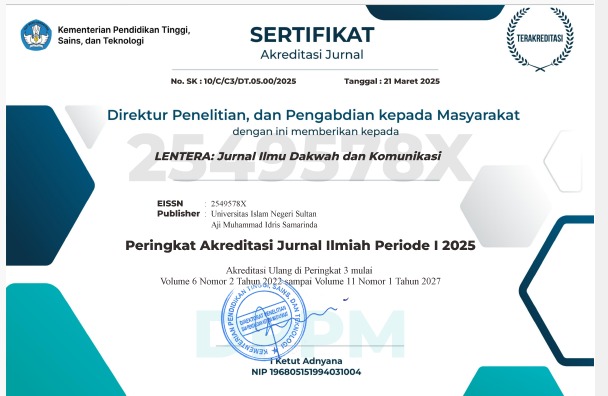UJARAN KEBENCIAN DALAM DAKWAH: ANALISIS TENTANG PENGEJAWANTAHAN IDE AMAR MA’RUF NAHI MUNGKAR DI KALANGAN PARA DA’I DI KALIMANTAN TIMUR
Abstract
Hate speech is among the most vicious problem faced by Muslims in the world. As Muslims are obliged to perform the principle of al amr bi al ma’ruf wa tanhawna anil munkar (commanding right and forbidding evil), what perceived as hate speech sometimes overlaps such basic tenet of Islamic principle of commanding right and forbidding wrong. The aim of this research is therefore twofold. First, it explore the contruction of hate speech among Da’is (Islamic preachers) in traditional Islamic boarding schools in East Kalimantan. And Seccondly, it explores ideal responses toward such practices as perceived by those Da’is. Findings suggest that the construction of hate speeches and ideal responses towerds it, among Da’is in Islamic traditional boarding schools known as pondok pesantrens, is founded mostly upon the principle of potential damage of those hate speech practices.
Keywords: Hate speech, Islamic Da’wa, and Da’is in East Kalimantan.
References
Cook, Michael. Commanding Right and Forbidding Wrong in Islamic Thought. Cambridge, UK ; New York: Cambridge University Press, 2000.
Hefner, Robert W. Civil Islam: Muslims and Democratization in Indonesia. Princeton Studies in Muslim Politics. Princeton, NJ: Princeton University Press, 2000.
Johan Meuleman. “‘Dakwah’, Competition for Authority, and Development.” Bijdragen Tot de Taal-, Land- En Volkenkunde 167, no. 2/3 (2011): 236–69.
Kuiper, Matthew J. Daʻwa and Other Religions: Indian Muslims and the Modern Resurgence of Global Islamic Activism. Routledge Islamic Studies Series, v. 27. New York, NY: Routledge, 2018.
Media, Kompas Cyber. “Atur Penyebaran Agama, Kemenag Susun RUU Perlindungan Umat Beragama.” KOMPAS.com, November 10, 2014. https://nasional.kompas.com/read/2014/11/10/19042201/Atur.Penyebaran.Agama.Kemenag.Susun.RUU.Perlindungan.Umat.Beragama.
Tibi, Bassam. “Islamism and Democracy: On the Compatibility of Institutional Islamism and the Political Culture of Democracy.” Totalitarian Movements and Political Religions 10, no. 2 (June 2009): 135–64. https://doi.org/10.1080/14690760903192073.
———. Islamism and Islam. New Haven: Yale University Press, 2012.
———. “The Politicization of Islam into Islamism in the Context of Global Religious Fundamentalism.” The Journal of the Middle East and Africa 1, no. 2 (October 22, 2010): 153–70. https://doi.org/10.1080/21520844.2010.517512.
Waldron, Jeremy. The Harm in Hate Speech. The Oliver Wendell Holmes Lectures, 2009. Cambridge, Mass: Harvard University Press, 2012.
Copyright (c) 2018 LENTERA: Jurnal Ilmu Dakwah dan Komunikasi

This work is licensed under a Creative Commons Attribution-ShareAlike 4.0 International License.
Penulis yang menerbitkan artikel di Lentera: Jurnal Ilmu Dakwah dan Komunikasi setuju dengan ketentuan berikut:
- Penulis memiliki hak cipta artikel dan memberikan hak jurnal untuk publikasi pertama dengan karya yang secara simultan dilisensikan di bawah CC-BY-SA atau The Creative Commons Attribution – ShareAlike Licence.
- Penulis dapat membuat perjanjian kontrak tambahan yang terpisah untuk distribusi non-eksklusif versi jurnal yang diterbitkan dari karya tersebut (misalnya, mempostingnya ke repositori institusional atau menerbitkannya dalam sebuah buku), dengan pengakuan atas publikasi awalnya di jurnal ini.
- Penulis diizinkan dan didorong untuk memposting pekerjaan mereka secara online (misalnya, dalam repositori institusional atau di situs web mereka) sebelum dan selama proses pengajuan, karena dapat menyebabkan pertukaran yang produktif, serta kutipan yang lebih awal dan lebih besar dari karya yang diterbitkan (Lihat The Effect of Open Access)
Authors who publish articles in Lentera: Jurnal Ilmu Dakwah dan Komunikasi agree to the following terms:
- Authors retain copyright of the article and grant the journal right of first publication with the work simultaneously licensed under a CC-BY-SA or The Creative Commons Attribution–ShareAlike License.
- Authors are able to enter into separate, additional contractual arrangements for the non-exclusive distribution of the journal's published version of the work (e.g., post it to an institutional repository or publish it in a book), with an acknowledgment of its initial publication in this journal.
- Authors are permitted and encouraged to post their work online (e.g., in institutional repositories or on their website) prior to and during the submission process, as it can lead to productive exchanges, as well as earlier and greater citation of published work (See The Effect of Open Access).












.png)
